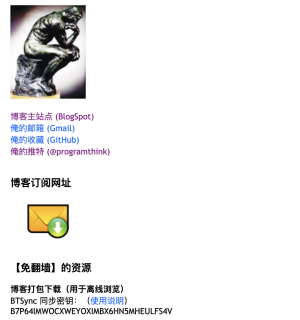“Program-think”的版本间的差异
来自China Digital Space
小 (文本替换 - 替换“Category”为“分类”) |
|||
| (未显示另一用户的1个中间版本) | |||
| 第4行: | 第4行: | ||
==Biānchéng suíxiǎng | [[编程随想]]== | ==Biānchéng suíxiǎng | [[编程随想]]== | ||
| − | |||
[[File:Sdghjkshtjksrh.png|thumb|right|''Program-think's Blogspot ([https://program-think.blogspot.com/ program-think])'']] | [[File:Sdghjkshtjksrh.png|thumb|right|''Program-think's Blogspot ([https://program-think.blogspot.com/ program-think])'']] | ||
| 第41行: | 第40行: | ||
<references /> | <references /> | ||
| − | [[ | + | [[分类:People]] |
2023年8月7日 (一) 05:01的最新版本
Biānchéng suíxiǎng | 编程随想

Program-think is an anonymous Chinese hacktivist-blogger. For more than 12 years, they maintained a Blogspot page where they posted political commentary, instructions on evading China's Great Firewall, and exposés of high-ranking officials in the Chinese Communist Party. In addition, program-think also frequently wrote on a wide range of popular issues in the fields of history, sociology, and psychology.
From May 9, 2021, program-think ceased to be active on their blog and social media accounts, sparking fears among readers and activists that the blogger may have been identified and detained by Chinese authorities.
Origins
Program-think's blog launched on Blogger on January 15, 2009. The author of the blog originally wrote largely about IT and programming, but from 2010-11 began writing increasingly on politically sensitive topics. Their blog became known as a must-read for anyone who had just arrived on the other side of the Great Firewall. For readers who had trouble scaling the wall, program-think provided "offline browsing" and "email subscription" services, as well as a quarterly update on security news and a review of their own security practices.[1]
In 2013, program-think was nominated for best Chinese blog at the Deutsche Welle International Best of Blogs Awards. The author told Deutsche Welle that it was never their intention to write on politics, merely to share their years of programming experience.
Princeling Network Map and Github Controversy
On Feburary 29, 2016, program-think launched the Princeling Network Map on Github, exposing the connections and hidden wealth of high-ranking members of the CCP. The project collected public information from Wikipedia and reporting from international media outlets including the New York Times, the Wall Street Journal, and others. The project includes details on more than 130 families and 700 individuals.
On June 8, 2016, China's quasi-official Cyber Security Association of China issued its first takedown request to Github, claiming that the Princeling Network Map "vilifies our President Xi Jingping as a murder suspect, which is a groundless and malicious slander]." Github complied by suspending access to the project for users in mainland China, but the project continues to remain accessible for users outside the Great Firewall.
Evading the Authorities
For more than 12 years, program-think succeeded in masking their identity and evading arrest by Chinese authorities, despite continuing to reside and write from China. In 2019, to mark the tenth anniversary of the blog, the author published an exhaustive post documenting their experience eluding China's cyber police, as well as a guide for readers on how to cover their own identities online. An excerpt of this and other of program-think's posts has been translated by China Digital Times.
Disappearance
Program-think's blog and social media accounts have not been active since May 9, 2021. In previous posts, program-think implied that any inactivity on their accounts for longer than two weeks meant they had been captured by authorities. On June 15, 2021, Radio Free Asia cited a social media account claiming that program-think had been detained in Shanghai and possibly tortured, but this was later refuted by another netizen.
In June 2021, CDT found that "program-think" was banned from search on the Bilibili site and app, but that a Google search outside of China did show results for related content. "Program-think" did not return relevant results on Douyin. WeChat had not entirely blocked searches for "program-think," and in fact would autocomplete with "caught," but no relevant content would show up in public accounts. The text of a few of program-think's blog posts could still be found on Weibo and Zhihu.




